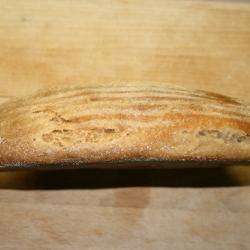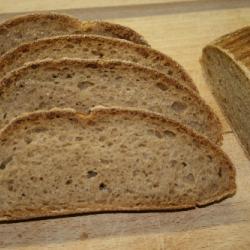
Hi everyone,
I have finished another loaf in my (so far) short sourdough-on-weekends-career and although the result was a "passable" one I am frustrated it didn't risen more up.
I have also noticed that the scares haven't opened so wide neither after baking and although the loaf seems all right from the top view...

...the side view shows how flat it acually is...

An inside inspection revealed an average amount of "bubbles " which judging by common sense probably means that the dough was "alive" enough...but still haven't risen very high...

This was a small loaf only (about 600g) and I used the basic sourdough recipe: about 2 tbs of a stater (100% hydration), 400g white flour (in the UK called "strong"), 200g rye flour, 1 flat tbs of cummin seeds, water, salt...
I have taken the starter portion from the fridge the night before baking, combined with the 100g of rye flour and 100ml of water and left to revive it during the night. Next day I mixed up all the rest and baked as usual...
Could some more advanced of you kindly advise me why probably the bread has risen only so little and what should I do better next time?
Thanks
Ladislav


Replies
Hello Ladislav
A bit more detail might help. For instance how much water (hydration) for the dough, preparation details (autolyse,kneading, bulk ferment, proving, times etc) and baking (temp, time, steam etc)
From the photos, you have a good distribution of holes in the crumb and what appears to be lacking is oven spring and there is also a bit of a split near the base. I have seen this effect in over-proved loaves though I cannot guarantee that it is a diagnostic.
Perhaps others will know better and the greater detail will help.
Farinam
Thanks farinam,
there is some more info as how I have baked the loaf:
total water added to the dough: 350ml, autolyse 30min, kneading about 10min (usually until the gluten devepment looks satisfactory), bulk ferment about 2,5 hours, proving about 2 hours, baking: 5min in 250C, then about 25 min in 210C, a layers of lava rocks on the base level of the oven with about half of a glass water added to develop steam...
Let me know what you think...
Ladislav
Ladislav,
Is the 100g rye used to feed the starter included in the 200g mentioned or is your dough starter plus 400 white plus 200g rye?
Farinam
Yes it is included: 100g of rye to feed the starter, then all the rest (100g of rye +400g of white)...
Ladislav
I agree with the reply that says more info is needed to be specific about what might help, but from what I read, here are a couple of suggestions.
Starter straight out of the fridge can be a little sluggish, so I'd suggest bringing it out a day (24 hrs) earlier and feeding twice at 12 hour intervals (one on removing from fridge, and one 12 hrs later), then use in it's now active state into your 100 g flour/100g water of levain/sponge/whateveryoucallit.
Other thing is that at 1/3 rye, it's going to be lower than say a predominantly white loaf in terems of gluten, and so a little more difficult to get gluten development needed for a bigger rise. You might try backing off to say 100 g rye and 500 g white, and see how it works at that ratio. I've baked rye at percentages from 5%, 10%, 20%, 30%, 70% and 100%. As you get more rye, your loaves get flatter (for me anyway!). This means that for whatever gluten you do have, kneading/stretch-and-folding well to get the most out of it might be important...
Thanks davo,
yes, I know what you mean, I usually revive the slugish starter about the same (twice in 24 hours) if it needs to, but if the starter feded once looks vigorous enough (as it did on that particular baking) it seems OK to me to go on with the baking...
I know that higher ratio of rye flour gets less gluten to the dough but still I have seen some pretty risen loafs with high rye ratio...I think I should investigate closer in those bakeries about the process they are using...hope that the "magic" answer will not be the usage of yeast though:))
And I also added some more details (above) about the flat loaf in question...
Cheers
Ladislav
I didn't see that you did any stretch-and-folds during the bulk ferment (maybe you do). If you can work this in (ie you are around the house while it's fermenting) this may help keep the gluten development optimal. Also, are you developing some tension in the skin when you shape?
And what are you baking on - a stone? If so, is it well hot when you put the loaf in - I find that if the oven is hot and so is the stone, it flattens out over the first few minutes as the dough seems to soften with the heat - if you look at the 5 min mark it can look a bit depressing, but then it perks right up over the next 10-15 minutes (up to the 20 min mark, ish). I find that if the stone is not right up to temperature, the loaf can flatten out for the first few minutes (as normal) but then not rebound and then rise above where it started. So you might wish to try making sure your stone is hot (I warm the oven with stone in it for almost an hour. Also you could try your first burst of high heat for a fair bit more than 5 minutes - turning it down after 5 mins to me seems like taking the foot off the inflation accelerator (temperature!) while the loaf is gloopy-soft and prone to either expand in a rise - or spread out flat. Mid you my loaves are nearly a kilo and I bake them for 45 -50 mins usually - so maybe your smaller loaf won't rise for 20 or so minutes. But try say 10-12 mins at high heat, maybe, before turning down?
I didn't see that you did any stretch-and-folds during the bulk ferment (maybe you do). If you can work this in (ie you are around the house while it's fermenting) this may help keep the gluten development optimal. Also, are you developing some tension in the skin when you shape?
And what are you baking on - a stone? If so, is it well hot when you put the loaf in - I find that if the oven is hot and so is the stone, it flattens out over the first few minutes as the dough seems to soften with the heat - if you look at the 5 min mark it can look a bit depressing, but then it perks right up over the next 10-15 minutes (up to the 20 min mark, ish). I find that if the stone is not right up to temperature, the loaf can flatten out for the first few minutes (as normal) but then not rebound and then rise above where it started. So you might wish to try making sure your stone is hot (I warm the oven with stone in it for almost an hour. Also you could try your first burst of high heat for a fair bit more than 5 minutes - turning it down after 5 mins to me seems like taking the foot off the inflation accelerator (temperature!) while the loaf is gloopy-soft and prone to either expand in a rise - or spread out flat. Mid you my loaves are nearly a kilo and I bake them for 45 -50 mins usually - so maybe your smaller loaf won't rise for 20 or so minutes. But try say 10-12 mins at high heat, maybe, before turning down?
I didn't do any stretch and folds this time during the bulk ferment as I was not around...
I am baking on the metal (enamel) baking tray and I checked before using the termostat a thermometer that the tin is hot the same as the oven...
I will try to leave it on 250C mark a bit longer next time and see what it does...
Thanks
Ladislav
Ladislav,
You say you loaf is only 600g but the masses that you quote indicate a dough mass of around 1100g. Are you baking two loaves from your dough or am I missing something.
If the rye flour 200g is divided 100g to feed starter and 100g to make dough, then I calculate that your dough hydration is 76%. Nothing wrong with that per se, but perhaps you could also try a less hydrated dough. If you cut the water back to 320g then your hydration would be 71% which is around the mark that I use for a similar recipe although I use wholemeal wheat flour rather than the rye.
Keep on bakin'
Farinam
As well as the others' comments about flour composition, stretch-and-fold and oven temperatures, it looks to me as if your slashes weren't long enough to accomodate the rise the bread was trying for - that's probably why you got the splitting at the sides. It had to work harder to split at the sides, too, and in my experience that tends to make the baked loaf a bit denser. Try slightly longer slashes next time - the second should overlap the first slightly, etc.